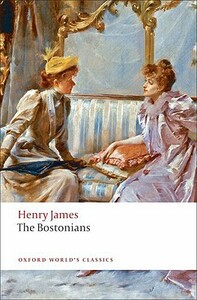Take a photo of a barcode or cover
challenging
emotional
sad
tense
slow-paced
Plot or Character Driven:
Character
Strong character development:
No
Loveable characters:
No
Diverse cast of characters:
Complicated
Flaws of characters a main focus:
Yes
This book really set out to do what it was trying to do. It perfectly encompassed the tricky power dynamics and rampant hypocrisy and any social justice movement. It made me SO ANGRY so often, but that was probably the point. I was fuming at the end–absolutely FUMING.
funny
reflective
sad
slow-paced
Strong character development:
No
Loveable characters:
Complicated
Diverse cast of characters:
Yes
Flaws of characters a main focus:
Yes
I dislike how James antagonizes the feminist movement, but putting that aside, I found The Bostonians to actually be funny. The narrator is a character unto themselves, cheeky and clever. The novel also touches on the nature of attraction. Verena Tarrant and Basil Ransom could not be more different in their views, but their palpable attraction to each other develops instantly, independent of political stances. It’s difficult to see it happen, because you know that they will make each other unhappy in many ways, but it is a realistic portrayal of love with all its faults and scars. Seldom do people fall in love for the right reason, and James does not shy away from human nature in his portrayal of romance.
Henry James is an equal opportunity satirist, and The Bostonians features a wealth of opinions, all of which seem utterly ridiculous by the novel’s end. However, despite the witty and, at times, laugh out loud funny language, much of this book felt like Jane Austen gone wrong
The relationship between Olive and Verena reminded me of that of Austen’s Emma and Harriet, but while Emma is confident and assertive, Olive’s independence presents her to the reader as reticent and unpleasant, which is all the more disappointing because Olive might have been a fascinating character study in repressed homosexuality with resonance into the present. Likewise, Harriet is attracted by Emma’s world and thrilled to be her protege, but matures by the end of the novel to assess her choices and make her own decision. In contrast, Verena remains passive throughout the book, allowing herself to be possessed by one character after another, drawn to her like the newest doll. Halfway through the book, a Verena seems to make progress, explaining the plight of women in a powerful statement to Basil Ransom, ending with a declaration that “Good gentlemen, you have never been in the box, and you haven’t the least idea how it feels!” Unfortunately, Verena’s strength seems to end here, and James ends the book with a promise that Verena will be crying many more tears as a result of relationships. Tragic as this ending may be, it is hard to root for a character who is so pliable.
As for the romance, Basil Ransom feels like an unfortunate parody of Mr. Darcy, claiming to hate everything his lover stands for, yet falling for her charms. That said, flighty, simple Verena has nothing on proud, intelligent, determined Elizabeth Bennett. Indeed, it’s hard to know what attracts this seemingly bright (though incredibly obnoxious) man to Verena beyond her supposed beauty. The romance is questionably developed, which I suppose is characteristic of the time, but so much so that it’s hard to believe any of the events might have inspired passion between the characters. And, it almost goes without saying, Ransom’s stalking has none of the swoon-inducing drama of Darcy’s letter; I certainly didn’t fall for Ransom as I have for Darcy, but I almost don’t even feel bad that Verena ends up with him.
The relationship between Olive and Verena reminded me of that of Austen’s Emma and Harriet, but while Emma is confident and assertive, Olive’s independence presents her to the reader as reticent and unpleasant, which is all the more disappointing because Olive might have been a fascinating character study in repressed homosexuality with resonance into the present. Likewise, Harriet is attracted by Emma’s world and thrilled to be her protege, but matures by the end of the novel to assess her choices and make her own decision. In contrast, Verena remains passive throughout the book, allowing herself to be possessed by one character after another, drawn to her like the newest doll. Halfway through the book, a Verena seems to make progress, explaining the plight of women in a powerful statement to Basil Ransom, ending with a declaration that “Good gentlemen, you have never been in the box, and you haven’t the least idea how it feels!” Unfortunately, Verena’s strength seems to end here, and James ends the book with a promise that Verena will be crying many more tears as a result of relationships. Tragic as this ending may be, it is hard to root for a character who is so pliable.
As for the romance, Basil Ransom feels like an unfortunate parody of Mr. Darcy, claiming to hate everything his lover stands for, yet falling for her charms. That said, flighty, simple Verena has nothing on proud, intelligent, determined Elizabeth Bennett. Indeed, it’s hard to know what attracts this seemingly bright (though incredibly obnoxious) man to Verena beyond her supposed beauty. The romance is questionably developed, which I suppose is characteristic of the time, but so much so that it’s hard to believe any of the events might have inspired passion between the characters. And, it almost goes without saying, Ransom’s stalking has none of the swoon-inducing drama of Darcy’s letter; I certainly didn’t fall for Ransom as I have for Darcy, but I almost don’t even feel bad that Verena ends up with him.
It's slow so far. I like it while I'm reading it, but after I put it down I have no urge to pick it up. I'm now reading it on dailylit.com so that I can read a little bit each day.
There is absolutely no way to rate this book using "stars." On the one hand, this would be a great choice for students looking for illustrations of the way society might have viewed women, as a sex, & may still at some level. I'm not sure what James was aiming for in the writing. He may have changed his mind a couple of times. He seems to equally dislike and pity the "dried up" feminist old maid, her young protegee who seems to change her mind depending on whoever has the strongest will in her circle, and the cynical Southern gent, recently out of the civil war, who is devoted to chivalry as long as women understand that they are ultimately obligated to be what men want them to be.
What I hated most about this book was the depiction of the Young Woman just needing a man with a "firm hand." She says that she hates all of what's-his-name's beliefs, but yet she adores the man himself. However, none of the dialogue indicates that there is anything to the man beyond his opinions. He takes apart the girl's cause simply by mocking it & laughing (politely) at all of her efforts. James seemed to think (& there is plenty of support for him, then & more recently) that females don't really know what they want, or they want the opposite of what they say, or they really want somebody (a cute guy) to take charge of them & tell them what they want. I don't know how to label this without using the word "misogyny," but then, I suppose that's a word I'm just parroting.
....screw you, Chivalry.
What I hated most about this book was the depiction of the Young Woman just needing a man with a "firm hand." She says that she hates all of what's-his-name's beliefs, but yet she adores the man himself. However, none of the dialogue indicates that there is anything to the man beyond his opinions. He takes apart the girl's cause simply by mocking it & laughing (politely) at all of her efforts. James seemed to think (& there is plenty of support for him, then & more recently) that females don't really know what they want, or they want the opposite of what they say, or they really want somebody (a cute guy) to take charge of them & tell them what they want. I don't know how to label this without using the word "misogyny," but then, I suppose that's a word I'm just parroting.
....screw you, Chivalry.
Published in 1886, "The Bostonians" begins with the arrival in Boston of Basil Ransom, a young Mississippi lawyer in search of a career. Through his cousin, Olive Chancellor, Ransom comes to meet Verena, the beautiful daughter of a charlatan faith-healer and showman.
Não sei muito bem o que pensar deste triângulo amoroso (porque durante toda a leitura não consegui deixar de pensar que a obsessão de Olive por Verena era muito mais romântica do que intelectual), em que uma jovem sem aparentemente qualquer vontade própria está emboscada entre uma natureza controladora (apesar de professar a libertação da mulher não tem qualquer pejo em pagar aos pais de Verena para a deixarem tomar conta do seu destino) e passivo-agressiva (as discussões entre as duas mulheres são sempre neste sentido); e outra cuja determinação começa a certa altura a ser do domínio do assédio (e que no fim não lhe dá mais capacidade de escolha do que a primeira). Também a competição entre Olive e Basil parece ultrapassar o objeto dos seus desejos, como se Verena não fosse afinal mais do que o símbolo do antagonismo entre eles. No final, é o masculino que vence, o que dá ideia da sensação que é transmitida sobre a primeira onda do feminismo (e sobre uma relação entre duas mulheres...)




